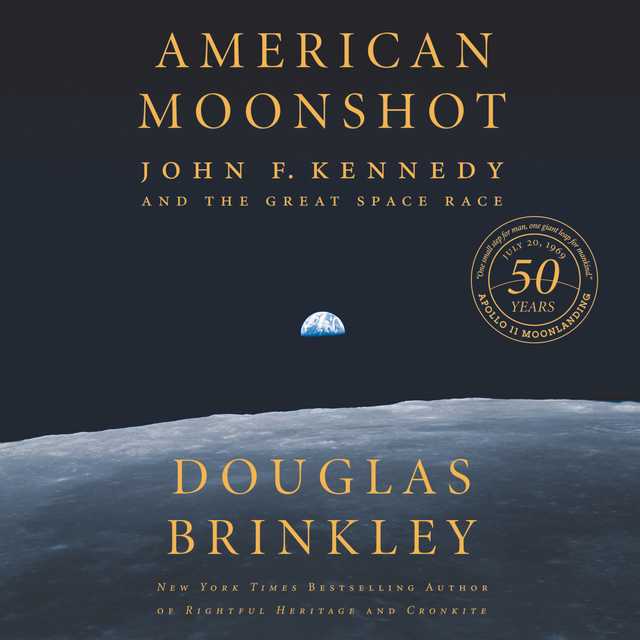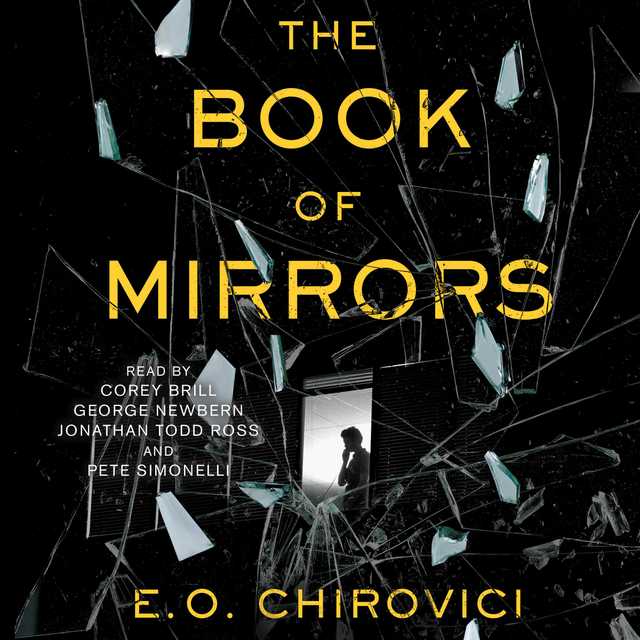American Moonshot Audiobook Summary
2020 Audie Awards(r) WINNER – History/Biography
As the fiftieth anniversary of the first lunar landing approaches, the award winning historian and perennial New York Times bestselling author takes a fresh look at the space program, President John F. Kennedy’s inspiring challenge, and America’s race to the moon.
“We choose to go to the Moon in this decade and do the other things, not because they are easy, but because they are hard; because that goal will serve to organize and measure the best of our energies and skills, because that challenge is one that we are willing to accept, one we are unwilling to postpone, and one we intend to win.”–President John F. Kennedy
On May 25, 1961, JFK made an astonishing announcement: his goal of putting a man on the moon by the end of the decade. In this engrossing, fast-paced epic, Douglas Brinkley returns to the 1960s to recreate one of the most exciting and ambitious achievements in the history of humankind. American Moonshot brings together the extraordinary political, cultural, and scientific factors that fueled the birth and development of NASA and the Mercury, Gemini and Apollo projects, which shot the United States to victory in the space race against the Soviet Union at the height of the Cold War.
Drawing on new primary source material and major interviews with many of the surviving figures who were key to America’s success, Brinkley brings this fascinating history to life as never before. American Moonshot is a portrait of the brilliant men and women who made this giant leap possible, the technology that enabled us to propel men beyond earth’s orbit to the moon and return them safely, and the geopolitical tensions that spurred Kennedy to commit himself fully to this audacious dream. Brinkley’s ensemble cast of New Frontier characters include rocketeer Wernher von Braun, astronaut John Glenn and space booster Lyndon Johnson.
A vivid and enthralling chronicle of one of the most thrilling, hopeful, and turbulent eras in the nation’s history, American Moonshot is an homage to scientific ingenuity, human curiosity, and the boundless American spirit.
Other Top Audiobooks
American Moonshot Audiobook Narrator
Stephen Graybill is the narrator of American Moonshot audiobook that was written by Douglas Brinkley
Douglas Brinkley is the Katherine Tsanoff Brown Chair in Humanities and Professor of History at Rice University, presidential historian for the New-York Historical Society, trustee of the Franklin D. Roosevelt Presidential Library, and a contributing editor at Vanity Fair. The Chicago Tribune dubbed him “America’s New Past Master.” He is the recipient of such distinguished environmental leadership prizes as the Frances K. Hutchison Medal (Garden Club of America), Robin W. Winks Award for Enhancing Public Understanding of National Parks (National Parks Conservation Association), and the U.S. Fish and Wildlife Service’s Lifetime Heritage Award. His book The Great Deluge: Hurricane Katrina, New Orleans, and the Mississippi Gulf Coast received the Robert F. Kennedy Book Award. He was awarded a Grammy for Presidential Suite and is the recipient of seven honorary doctorates in American studies. His two-volume, annotated Nixon Tapes recently won the Arthur S. Link-Warren F. Kuehl Prize. He lives in Austin, Texas, with his wife and three children.
About the Author(s) of American Moonshot
Douglas Brinkley is the author of American Moonshot
More From the Same
- Author : Douglas Brinkley
- The Boys of Pointe du Hoc
- Cronkite
- Rosa Parks
- The Great Deluge
- American Heritage History of the United States
- Publisher : HarperAudio
- Abraham
- American Gods [TV Tie-In]
- Dead Ringer
- House of Sand and Fog
- Prey
American Moonshot Full Details
| Narrator | Stephen Graybill |
| Length | 17 hours 14 minutes |
| Author | Douglas Brinkley |
| Category | |
| Publisher | HarperAudio |
| Release date | April 02, 2019 |
| ISBN | 9780062865878 |
Subjects
The publisher of the American Moonshot is HarperAudio. includes the following subjects: The BISAC Subject Code is Expeditions & Discoveries, History
Additional info
The publisher of the American Moonshot is HarperAudio. The imprint is HarperAudio. It is supplied by HarperAudio. The ISBN-13 is 9780062865878.
Global Availability
This book is only available in the United States.
Goodreads Reviews
Will
April 13, 2020
“We choose to go to the moon--we choose to go to the moon in this decade and do the other things, not because they are easy, but because they are hard, because that goal will serve to organize and measure the best of our energies and skills, because the challenge is one that we are willing to accept, one we are unwilling to postpone, and one which we intend to win.” – JFK at Rice University- September 12, 1962. “The Eagle has landed.” – Neil Armstrong, July 20, 1969JFK delivering his “we choose to go to the moon” speech at Rice University – image from History Hub. Public Affairs Officer – Three minutes, 45 seconds and counting. In the final abort checks between several key members of the crew here in the control center and the astronauts, Launch Operations Manager Paul Donnelly wished the crew, on the launch teams' behalf, "Good luck and Godspeed." There have been many events in American history that can bring one to tears, decades later. There is no shortage of dark moments in our violent past, domestic and international. I was alive in 1963 when JFK was murdered, and when RFK and MLK were killed by sinister forces. Recalling those moments can bring tears of grief, a sense of a blow to us all, as well as a feeling of personal loss. 9/11 was a Pearl Harbor trauma for the 21st century. I choke up even thinking about it. But there have also been moments when threatened waterworks were of a very different sort. Moments of joy and pride, being at Woodstock, the 1969 and 1986 Mets, (OK, so maybe those two were not national events in the same way, fine) the election of Barack Obama and that day in July 1969 when a promise was kept, an ages-long dream was no longer deferred, and in the name of our global humanity, a human being first set foot on the moon. For me, in my lifetime, there has never been a prouder moment to be an American.Saturn C-1 - a predecessor to the Saturn V that would boost the Apollo missions - Image from This Day in AviationPublic Affairs Officer – Two minutes, 30 seconds and counting; we're still Go on Apollo 11 at this time. Douglas Brinkley has been charting the history of the United States since the 1990s. The guy has some range. He was a mentee of Stephen Ambrose, which should be recommendation enough. In addition, he was literary executor for Hunter S. Thompson, and was the authorized biographer for Jack Kerouac. He has been active in and has written about the environmental movement, and has been attacked by occasional Republicans, which usually means he is doing something right. Brinkley is CNN’s goto expert on things presidential, having written books about many of them. His focus here is on the brief, but impactful presidency of John Fitzgerald Kennedy, and how he led the nation to the signal achievement of transporting a man to the moon and bringing him safely home. Douglas Brinkley - image from politicaldig.comPublic Affairs Officer – We just passed the 2-minute mark in the countdown. Brinkley follows JFKs early life, from so-so student, enduring considerable medical miseries and enjoying a very active social life, both in two prep schools and then in two different colleges to someone with a keen interest in and talent for public policy. Of particular interest is the impact of seeing the face of fascism in 1932 when he toured Germany in a bit of a reconnoiter for his politically connected father, who would be appointed the US ambassador to the United Kingdom a few years later. Wernher von Braun - image from Space.comPublic Affairs Officer – T minus 1 minute, 54 seconds and counting. Our status board indicates that the oxidizer tanks in the second and third stages now have pressurized. We continue to build up pressure in all three stages here at the last minute to prepare it for lift-offFor much of the book, Brinkley parallels JFK’s rise with the career of Wernher von Braun, the German rocket expert who had overseen the development of the V-1 and V-2 rockets that Hitler used in attacking England. Von Braun is a fascinating character, however much his Hitlerian expedience marked him as a war criminal. Thousands of slave laborers perished in the Peenemünde rocket development site that he ran. He had dreamed of making space flight a reality ever since he was a child, and was willing to do whatever it took to move this goal forward. Post World War II, with the USA and the Soviet Union gearing up for the possible next great war, von Braun’s expertise was in high demand. He found his way to American forces in Germany, bringing with him a considerable supply of materials and research. Under a program called Operation Paperclip von Braun, and many other technically expert Germans, were brought to the United States to aid in the impending showdown with the Soviet Union. You will appreciate Tom Lehrer’s parodic ditty about him.Apollo 11 en route to Launch Pad 39A - image from NASAPublic Affairs Officer – One minute, 25 seconds and counting. Our status board indicates the third stage completely pressurized. Von Braun was, and remained a key player in the USA’s space program, being the force behind the development of the huge Saturn-V launch vehicle that sent most of the Apollo missions on their way. He remained a subject of considerable controversy, which he parried by becoming as American an immigrant as he possibly could. He had a gift for public relations, which led to a TV show promoting space travel, and a consultancy with Walt Disney to help design Tomorrowland at Disney’s new theme park. His articles appeared in many national magazines, which helped keep the space program in the national consciousness, a beautiful thing for those who supported American space efforts. It also made him a powerful friend in the new president. The two men were more than just convenient allies.Apollo 11 at Launch Pad 39A - image from NASAPublic Affairs Officer – We're approaching the 60-second mark on the Apollo 11 mission. We get a good overview of JFKs career, his heroism in the Pacific, and the subsequent fame he received for his PT-109 adventure, after a book written about the episode became a national best-seller, with help from his father. On domestic policy he was certainly of a liberal bent, but his foreign policy placed him much more in a conservative posture. He had seen what authoritarianism looked like and was eager to challenge it wherever possible, seeing the Soviet Union as the major authoritarian threat in the world. The crew heads to Launch Pad 39A - image from NASAPublic Affairs Officer – 55 seconds and counting. Neil Armstrong just reported back: "It's been a real smooth countdown". Brinkley catches us up on the progress, or lack of same, in the USA’s space program in the 1950s, as it was fraught with military branch in-fighting and was short on successes. But the launch of Sputnik was the wakeup call it took to refocus American interest in space. There remained naysayers, and many who believed that resources targeted to space exploration and development would have been better spent on more earthbound pursuits. But there was a growing sense that the country needed to make some serious headway in the exploration of space, lest the country be left in the dust by the Soviet advances, with repercussions that were not only military, but political and economic as well. Spacecraft communicators in mission control - image from NASAPublic Affairs Officer – We've passed the 50-second mark. Power transfer is complete - we're on internal power with the launch vehicle at this time. What Brinkley captures here is Kennedy’s view of the whole enterprise as a main act in the Cold War, the peaceable competition of the Western states, led by the USA, with the Eastern bloc, led by the Soviet Union. The East and West were not only doing kinetic battle in proxy wars like Vietnam, but struggling to win hearts and minds across the planet. Kennedy saw that US success in the space race would elevate the status of the West, leading many to tilt West instead of East when looking for alliances. He also emphasizes that Kennedy saw the space effort as a form of Keynesian economy-boosting similar to the infrastructure development of the FDR era. Kennedy was also quite aware of the likelihood that the research undertaken in this project would leapfrog the USA ahead in technological development, with impact in fields across the economy. Brinkley offers an impressive list of some of the developments that were created or boosted by the space program.Apollo 11 at ignition - image from NASAPublic Affairs Officer – 40 seconds away from the Apollo 11 lift-off. All the second stage tanks now pressurized. 35 seconds and counting. Just as Trump is a clear master of the new tech of Twitter, JFK was an early master of the PR potential of television, holding press conferences every sixteen days to make sure the messages his administration wanted in the public eye remained there. The focus on locating much of the NASA program in southern states was his version of a Southern Strategy, looking to build support for himself and Democrats by channeling federal investment where it was likely to do the most political good. But also, the nation was emerging from a recession, and a big public works project, like Eisenhauer’s national highway program, would pump enough money into the sluggish economy to get it moving again. It succeeded wildly in that.Launches - image from NASAPublic Affairs Officer – We are still Go with Apollo 11. 30 seconds and counting. Astronauts report, "It feels good". T minus 25 seconds. One thing that the book makes eminently clear was that Vice President Johnson was not only all in on supporting the Apollo program, he in fact was much more knowledgeable about the realities of space exploration challenges than JFK ever was. In addition, while Kennedy, privately, was more concerned with the potential military advantages of the space program, Johnson was more firmly in the peaceful-uses camp. Liftoff - image from NASAPublic Affairs Officer – LIFT-OFF! We have a lift-off, 32 minutes past the hour. Lift-off on Apollo 11. One of the great joys of reading a well-researched work of history is the opportunity to pick up some nuggets of odd intel here and there. For example, where the term “moonshot” originated, JFKs fondness for Joe McCarthy, the existence of a program that you probably never heard of that preceded and spurred US manned space flight, who was really the first man to orbit the earth, and a new update on the first words from the Moon. Apollo 11 clears the tower - image from NASAPublic Affairs Officer – Tower clearedThe 1960s was certainly a very exciting time in the USA. There was a lot going on, not all of it wonderful, but there was a drive to move beyond, to move forward, to fulfill not only the dream of our fallen leader but a dream that had been shared by humanity for as long as people had looked up and wondered about that thing in the sky. Douglas Brinkley has given us an insightful and informative look into the nuts and bolts of how Apollo 11 came to be, into some of the geopolitical forces of the Cold War, into the domestic political battles that were being engaged, into the economic considerations that fed JFKs need to push forward, and into the personalities that proclaimed the mission as achievable and then used all their powers to drive the mission forward to a glorious fulfillment. He shows the impact of the program on our relationship with the Soviet Union, and the impact the program had on our economy. In doing this, he has captured the feel of the time, the excitement about, as well as fear for, the manned space missions, and ultimately the joy in seeing the dream realized. He has given us a sense of who the people involved really were, and what drove them. It is a very readable history, and for someone who has been a lifelong fan of space exploration, it is no exaggeration to say that American Moonshot is out of this world. Apollo 11 at about 4,000 feet - image from NASAReview posted – April 26, 2019Publication date – April 2, 2019Lunar Module at Tranquility Bay – image from NASA=============================EXTRA STUFFBrinkley’s personal siteHe has a twitter page, but it has not been updated since 2013. I found no personal Facebook page for him.Brinkley non-book writings and/or appearances (partial)-----CNN-----Vanity Fair-----NY Times-----RollingStone-----Foreign PolicyInterviews-----The Reading Life with Douglas Brinkley with Susan Larson – audio – 28:56Really, this one should doItems of Interest-----Operation Paperclip-----Peenemünde-----V-1 flying bomb-----V-2 Rocket-----A 1955 video in which von Braun describes his plan for not only a manned moon mission, but a permanent space station-----The NASA log of the Apollo 11 flight from which I extracted the “Public Affairs Officer” announcements included in the review-----JFK’s We choose to go to the moon speech at Rice University – Video – 18:15-----A transcript of that speech-----C-SPAN – a nice documentary on the 25th anniversary of Apollo 11 mission-----Smithsonian Magazine - June 2019 - What You Didn’t Know About the Apollo 11 Mission - by Charles Fishman - excellent, informative article. Worth a look.-----New York Times - June 14, 2019 - Fifty Years Ago We Landed on the Moon. Why Should We Care Now? By Jill Lepore - interesting look at the extant rash of Apollo 11 anniversary books and sociopolitical implicationsMusic-----Space Oddity-----Telestar - by The Tornadoes
Porter
September 14, 2019
I don’t know if the Pulitzer Prize committee is going to feel sentimental about the 50th anniversary of the moonlanding, but if it does, then I would not be surprised if this book wins it.This is by far the best book about the space race that I’ve encountered.While other books focus on the astronauts and the space program, this book deals with American culture and politics that drove the space race.The book starts off talking about the earliest days of flight and rocket science, but unlike other books dealing with the space race, this one delves into the cultural conceptions of space. It talks about how characters such as Buck Rogers, Flash Gordon, and those cheesy movies from the first half the 20th century shaped America’s passion for space.It then delves into the research of the German’s and weaponization of the rocket science during WWII.During the war, the German scientist negotiated with the Americans and avoided being tried as War Criminals in exchange for helping America’s rocket program. After the war, they helped America, but when Eisenhower was elected president, funding came to a virtual halt. Ike never fully trusted the scientist of the country he fought.While Eisenhower was lauded for many things, during his presidency the Russians achieved numerous symbolic victories---the first space launch, the first animal in space, the first man in space, etc. While other books mention these events and how state that they fueled America, this book shows you how and why it fueled America. It also talks about how Democratic candidates (namely Kennedy and Johnson) saw these events as a path to the presidency.Both men embraced the space race seeing it as a means to attack a popular presidency.Johnson made a great quote about how the Romans dominated the world because they ruled the roads, the British dominated the world because they ruled the seas, America dominated the world because it owned the air, but that the Russians were situated to dominate the world because the US was not going to challenge the them in ruling space.Kennedy, despite being briefed by the FBI to the contrary, made allegations that there was a missile gap with Russia. Eisenhower and Nixon could not refute Kennedy’s claims without revealing their sources. (This isn’t the only place wherein Kennedy misrepresented the Eisenhower/Nixon presidency knowing that they could not respond without violating America’s intelligence network.)After being elected, Kennedy/Johnson pushed the space program. Kennedy’s challenge to place a man on the moon was a big gamble. Brinkley discusses the political realities’ of making the moonshot a reality. While we often think of the period as a great unification/push for the moon, it was a politically divided issue. The moonshot was criticized because others argued the money would have been better spent fighting poverty, curing cancer, dealing with civil rights, etc. One of the interesting conclusions of the book is that without the Kennedy assassination, America might not have made it to the moon and if we did it might not have occurred within his stated goal. While it is not my pick for Pulitzer, it would not surprise me if it wins. It is about an important subject to America, during the 50th anniversary of a pivotal event, very well written, from a different point of view for the subject, by a respected author.
Sherry
July 28, 2019
Douglas Brinkley is an historian at Rice University and a pre-eminent scholar of US Presidents. This is the first book of his that I have read, but it won’t be the last. (In fact, I have his “Cronkite” sitting in my bookcase, waiting to be read.). Of course, I read this book to celebrate the fiftieth anniversary of the moon landing.“Moonshot” is less a book about the history of space exploration and more a book about John F. Kennedy’s decision to make the “race to the moon” a proxy for the Cold War with the Soviet Union, and a boon to U.S. technological leadership after WWII. The book begins as a biography of JFK and Werner von Braun, the German rocketeer behind building the V-1 and V-2 rockets that devastated so much of England during the War. Brinkley makes no bones about the fact that von Braun was complicit w/ the Nazis by utilizing the slave labor in these rocket programs. We see JFK turn into a deft politician and become more and more enamored w/ space for itself. He was like a little kid around the rockets and the astronauts! Of course, everyone around the space program was nervous about their funding when Kennedy was assassinated, but Johnson was equally determined that the U.S. be the first country to the moon, accomplished on July 20, 1969—an event I will always remember personally.Let this wonderful quote represent an excellent book: “We choose to go to the moon—we choose to go to the moon in this decade and do the other things, not because they are easy, but because they are hard, because that goal will serve to organize and measure the best of our energies and skills, because that challenge is one that we are willing to accept, one we are unwilling to postpone, and one we which we intend to win.” JFK, Sept. 12, 1962, speech at Rice University. (pp 363-364)
Brian
July 30, 2019
A truly great overview of the technological advances and political willpower needed to put Americans on the moon. The second half of the title is the most relevant. This is a Presidential biography of JFK filtered through the motivations and personality traits that led him to call for, motivate, push, cajole, and even cheerlead the Space Race. As it turns out, JFK was more indispensable than previously thought. It wasn't just the famous speeches; the willpower and enthusiasm emanating mainly from the President overcame deep opposition to funding and vision. The United States, in the 1960s, devoted 5% of the entire budget to NASA! That would be inconceivable at almost any other time.In addition to the story of Kennedy, Werner Van Braun and the technologies of World War II that transferred to NASA are also covered, and a great deal of the book does go into the depth of the technology and science. Brinkley also covers all of the incredible innovations that still are with us today. The book goes into "Epilogue" mode after JFK's assassination, leaving Gemini and Apollo as the culmination of JFK's dream, the major technological advances having been completed by the time of his death.Handsomely illustrated with high quality photos (both black and white and great color inserts in the middle), this is a book for those who want to read about the foundation of NASA, the technology behind the Mercury program and the space race in the 50s, as well as how JFK kept pushing all of the bureaucracy and institutions to pursue his and Van Braun's dream: to get there before the Soviets, to produce positive benefits for all mankind (lots of evidence here to support that), and finally how NASA prepared for Apollo. The landing itself is well documented; this is an accessible book on the lead up to that as well as JFK's part in it.
Larry
December 20, 2021
It is surprising that this book was published 50 years after the manned moon landing which it covers happened in 1969. I enjoyed listening to this audible book because it covered a period that I can remember snatches of, some only vaguely but some quite clearly. Some people believe that you can get a better view of history once you give it a little distance. In the case of this book I am not quite sure if that is accurate.Although this book covers the political life of John Kennedy quite thoroughly especially as it relates to the Apollo moon shot, and it does cover some of the highs and lows and political machinations that were involved in this massive lengthy process, it does bask a bit in the acclaim and honor that JFK may or may not fully deserve. It reminds us how much government money was put into this project and claims that there was a significant effort, with credit given to Kennedy of course, to spread the money around as liberally as possible to as many institutions and businesses as possible.The economic scope of this project of course almost seems small as it is limited to billions of dollars as we in the 21st-century now talk in terms of trillions of dollars. This story ends with the Apollo 11 returning from the moon. But it does remind many of us of the days of sputnik and the space race between the USA and the USSR. It reminds us how President Johnson when he was VP Johnson was very much a space exploration booster and worked his magic to get NASA located in Houston.Werner von Braun is of course a main character in the book and his moral complexity and the shift of many Nazi scientists to the US and the USSR is examined but not too closely. The author never gives von Braun a pass for his past sins but he gives him a lot of credit for what he did along with many other Germans presumably for the US space program. But all in all this book caste a glowing light on a adventure that had apparently a happy ending. Of course a few people died in the process including a few astronauts but that’s just life, isn’t it? There is quite a bit of reference to the NASA budgets that had to get passed through Congress over the decade but there is absolutely no substantial reference to individuals inside and outside the program who probably made a fortune for being a part of this project. There are allusions to people who said we would have been better to have spent the money in other ways, but that really just didn’t fit in too well with the main gist of the book. Which was really too emphasize the positive. Wasn’t this just terrific? And what if a couple of capsules sunk to the bottom of the ocean during recovery mishaps? Easy come, easy go!
Tori
October 20, 2019
This really was a fascinating story. And very easy reading - almost like a work of fiction. Even though I lived through these events, this book made me appreciate all the work that went on to land a man on the moon. I have to admit, I was a bit disappointed that the book as more about Kennedy than I had anticipated - but on further consideration, I appreciate all that I learned about him, too. And even though the book kind of zooms over the actual moon landing, because it occurred after JFK's assassination, it was a very good synopsis of events. I highlighted many passages to remind myself of the inspiring ideas shared.From Amelia Earhart: "The most difficult thing is the decision to act. The rest is merely tenacity."From JFK: "We choose to go to the moon in this decade and do the other things, not because they are easy, but because they are hard, because that goal will serve to organize and measure the best of our energies and skills, because that challenge is the one that we are willing to accept, one we are unwilling to postpone, and one which we intend to win."From Brinkley: "Throughout the United States there is a hunger today for another 'moonshot,' some shared national endeavor that will transcend partisan politics."From Brinkley: "Artists are often decades ahead of engineers and scientists in imagining the future."It was interesting to learn of Werner von Braun - who participated in Germany's weapon development during the war, but who was "snatched" for the US afterwards, to help with their space program, without being tried for war crimes. Also, interesting to think about the pros and cons of the space program. The cost was astronomical. The goal united various factions, but arguments were made about the good that could have been done in the country instead. I have so many other highlights - too much to include. But I did really enjoy this presidential biography that was so interrelated with the space race.
David
March 17, 2020
Fascinating history of the Space Race and early Mercury, Gemini, and Apollo Programs. Interesting approach by weaving parallel biographies of Werner von Braun and JFK in and out of a general history of the Space Race. A good primer on all three. Interesting to see Eisenhower's long-standing resistance to a moon shot. Recommended as a good starting place if you're interested in reading about the Space Program
Adam
December 01, 2020
If you are looking for a book about the Apollo 11 mission to the moon this is not the book. There are three pages in the Epilogue for that event. However if you want to know how we got to that moment in the preceding decade this is the book for you.
Sandi
April 06, 2019
Great read I was,so always excited by this American space program wish it was still going
John
June 26, 2020
American Moon Shot is a consummate historical reference regarding the political influence exercised by John Kennedy in effectuating the moon landing by U.S. astronauts. It details the reasoning for implementing the project and the toil required to establish and continue funding for this historic achievement. In addition, the book provides an excellent background summary of Robert Godard and Wernher von Braun. In particular, von Braun’s allegiance to the German Nazi party was well described in the book as well as his exoneration of any war crimes for developing the Nazi V series rockets that bombed London during World War II. Most assuredly without Operation Paperclip von Braun would have designated a war criminal and prosecuted with his cohorts.This book is a fascinating read by an author who writes both excellent history and in excellent style. Highly recommended!
Timothy
December 25, 2019
I found this to be a wonderful and enlightening read on the political side of the "Race to Space and the Moon", and those that fought for that vision. The passion of von Braun, Webb, President Kennedy and many others for the success of pushing the non-military usage of space... while using that same mission in the political one-upmanship with the Soviet Union...was intriguing reading. As was the accounts of the backroom maneuvering in Congress and other places to both push the program, but also to benefit from the largesse of the NASA budget.A large investment in reading time, but for me, a worthwhile one.
Austin
September 24, 2020
More a Presidential biography on one specific aspect of the President's presidency than a straight history of the effort to put a man on the moon, this is nevertheless a thorough and enjoyable read. Brinkley occasionally lapses into excessive lionization of Kennedy (and the space race), but otherwise spins a compelling narrative around Kennedy's fascination with space and the political & societal implications of his drive towards the moon. His unflinching portrayal of the problematic Werner Von Braun is also much appreciated.
Hannah
July 22, 2022
Loooong audiobook, but a great, informational one! I really enjoyed listening to this, especially since my commute to my internship took me past the Saturn V rocket at the Huntsville U.S. Space and Rocket Center everyday. JFK is a fascinating historical figure and I enjoyed hearing everything that built up to the USA putting a man on the moon, especially with all the history and people who contributed to the science. ~17 hours~ of listening but very engaging and it seemed very well-researched. Space is awesome.
Frequently asked questions
Listening to audiobooks not only easy, it is also very convenient. You can listen to audiobooks on almost every device. From your laptop to your smart phone or even a smart speaker like Apple HomePod or even Alexa. Here’s how you can get started listening to audiobooks.
- 1. Download your favorite audiobook app such as Speechify.
- 2. Sign up for an account.
- 3. Browse the library for the best audiobooks and select the first one for free
- 4. Download the audiobook file to your device
- 5. Open the Speechify audiobook app and select the audiobook you want to listen to.
- 6. Adjust the playback speed and other settings to your preference.
- 7. Press play and enjoy!
While you can listen to the bestsellers on almost any device, and preferences may vary, generally smart phones are offer the most convenience factor. You could be working out, grocery shopping, or even watching your dog in the dog park on a Saturday morning.
However, most audiobook apps work across multiple devices so you can pick up that riveting new Stephen King book you started at the dog park, back on your laptop when you get back home.
Speechify is one of the best apps for audiobooks. The pricing structure is the most competitive in the market and the app is easy to use. It features the best sellers and award winning authors. Listen to your favorite books or discover new ones and listen to real voice actors read to you. Getting started is easy, the first book is free.
Research showcasing the brain health benefits of reading on a regular basis is wide-ranging and undeniable. However, research comparing the benefits of reading vs listening is much more sparse. According to professor of psychology and author Dr. Kristen Willeumier, though, there is good reason to believe that the reading experience provided by audiobooks offers many of the same brain benefits as reading a physical book.
Audiobooks are recordings of books that are read aloud by a professional voice actor. The recordings are typically available for purchase and download in digital formats such as MP3, WMA, or AAC. They can also be streamed from online services like Speechify, Audible, AppleBooks, or Spotify.
You simply download the app onto your smart phone, create your account, and in Speechify, you can choose your first book, from our vast library of best-sellers and classics, to read for free.
Audiobooks, like real books can add up over time. Here’s where you can listen to audiobooks for free. Speechify let’s you read your first best seller for free. Apart from that, we have a vast selection of free audiobooks that you can enjoy. Get the same rich experience no matter if the book was free or not.
It depends. Yes, there are free audiobooks and paid audiobooks. Speechify offers a blend of both!
It varies. The easiest way depends on a few things. The app and service you use, which device, and platform. Speechify is the easiest way to listen to audiobooks. Downloading the app is quick. It is not a large app and does not eat up space on your iPhone or Android device.
Listening to audiobooks on your smart phone, with Speechify, is the easiest way to listen to audiobooks.






























